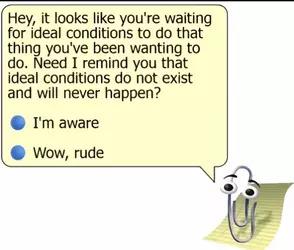Was his "just make games" his plan to destroy the indie scene? Gather as much retards as he can and push them to publish shitty games and flood the store to destruction? Pretty sure one of his advise is "just publish it and see what happens"

It's been enough time now that I've been able to think about this, and honestly, I'm inclined to agree with the idea of "just make games" from the perspective of, as a new game developer, your first major milestone should be to just ship
something so you can get experience with the full pipeline from conception to release, including setting up your store pages and whatnot. It's also likely a lot more satisfying than spending 10+ years faffing around with each individual piece and being Valvepilled throwing away close to 100% of your work (ask me how I know). I think it's okay to release something that's not you at your best because, well, you'll never be at your best.

What I don't agree with is the idea that you can get away with being mediocre and still be successful. He cites a bunch of examples of smash hit indie games from people who were weak in some aspect, i.e. the graphics are bad, the code is bad and so on, but there's a
massive survivorship bias there, and it's not a very nuanced take to begin with. Instead of focusing on what you DO need, he focuses on what you don't. For example he says Undertale succeeded in spite of its bad code, but I would say that's backwards, it succeeded because of its awesome soundtrack, story and overall presentation. He wrote that DDLC succeeded in spite of being made with an off-the-shelf VN engine, but I'd argue it succeeded because of its thought-provoking writing, near-perfect pacing, and again, presentation. Oh, and presenting Scott Cawthon as some kind of inspirational story is just about the dumbest way you can twist his 20 straight years making games nonstop without breaking even. Getting lucky with one super hit after all of that isn't quite the feel-good story that soydevs seem to think it is.
The takeaway from how he frames this is that you don't need to be good at anything, but the reality is you can get away with being "not so great" at one thing if you completely knock it out of the park in another. The truth is most games fall somewhere in the middle, not massively successful, they make enough money to keep the lights on, and they are "alright" in every aspect, and keep their niche fanbase coming back for more. If you check websites that track Steam review counts, you'll see that the majority of games fall into the 5-6 figure revenue bracket. The facts say to me: aim to be a jack of all trades, and if you can be the master of one, that's great, but an all-rounder will beat hyperspecialization in 99% of cases.

